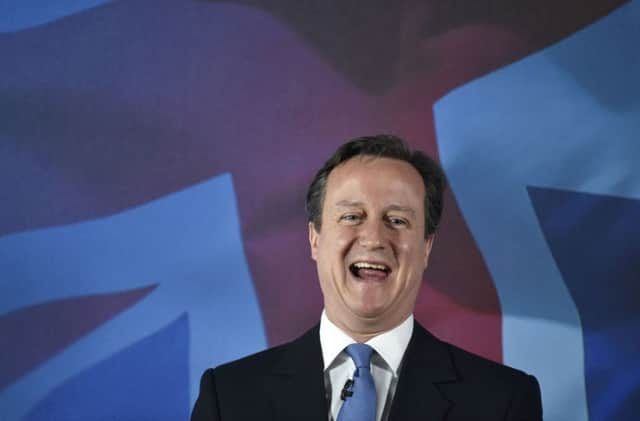Euan McColm: Does Cameron’s masterplan extend beyond his survival?


You may recall the then-shadow Home Secretary David Davis was expected to succeed Michael Howard, who had something of the deeply unpopular about him, and take the Tories forward to further electoral humiliation.
But a series of zingy speeches culminating with an undeniably top-notch pitch to his party during its autumn conference helped Cameron win over (enough of) even the most sceptical of the old guard. This young gun, they judged, might have had a whiff of the hated Tony Blair about him, but his promise that he’d bring a new generation to the party seemed rather appealing. The alternative – a painful, grinding descent into oblivion – didn’t have the same glister.
Advertisement
Hide AdAdvertisement
Hide AdHaving won the leadership contest, seeing off Davis, Liam Fox, and Ken Clarke, Cameron demonstrated that vision thing by… well, there were those photos of him driving some huskies through the snow, weren’t there? And, ehm…
It’s easy, even enjoyable, to dismiss Cameron as a man without much substance, but before I go on to do that, let’s dawdle over the good bits.
Cameron has shifted his party considerably on social issues, on matters of equality. In that regard he is a moderniser. But it is often difficult to grasp what it is the PM truly believes in. He has the Blair-esque presentation, sure, but as for what drives this politician, what big idea he has about the UK, we know very little.
On Friday, the Prime Minister returned to the matter of the introduction of legislation ensuring that, in a future Westminster parliament, only English MPs would be entitled to vote on legislation affecting only England.
You may recall that Cameron first signalled his determination to see English votes for English laws – or Evel – in the moments after the Better Together campaign won a No vote in last year’s independence referendum. It was a clumsy bit of one-upmanship, graceless, and divisive.
Rather than being magnanimous in victory, Cameron decided that this was just the time to try to ensure Scots MPs had limited power at Westminster. He may have sold this idea as being about fairness but it was, nakedly, about strengthening the Tories in parliament. With Scots MPs excluded from a whole raft of votes, then Labour would struggle ever to win a legislative majority. That the SNP has, since last September, ground Scottish Labour into the dirt is an unexpected bonus for the PM.
Having spent most of 2014 and a fair chunk of the previous year talking about his passionate belief in the UK, Cameron is now willing to create a system that would make Scots MPs second class.
First Minister Nicola Sturgeon – quite fairly – points out that Scottish MPs have every right to participate in any parliamentary vote where a decision has an impact north of the Border. For the time being, every penny spent in England has an impact on the amount released to the Scottish Government in the annual block grant.
Advertisement
Hide AdAdvertisement
Hide AdSo, Evel would only work if the Barnett Formula – the mechanism by which funds are allocated to Scotland – was abolished, and Holyrood was given full fiscal authority (or responsibility, as the SNP now prefers).
It’s hard to escape the reality that Cameron’s proposal can only weaken the Union.
The Tory leader’s sweet talk about Scotland being a cherished and important member of the United Kingdom’s family of nations rings hollow now. Cameron, it seems clear, doesn’t let potentially devastating consequences get in the way of an idea that might get him to the next staging post.
And it’s not just on Evel that Cameron has been guilty of short-sighted short-termism.
The Tory party’s promises during the campaign have at times resembled those of a fringe party with the luxury of promising the undeliverable rather than of serious contenders who might, quite soon, be expected to make good on their offers.
Look at his suggestion that the Tories would substantially increase weekend NHS services in England. It sounds great, convenient, aimed at making the health services work better for patients, but it’s also based on money that doesn’t actually exist.
The Prime Minister said he would find the £8 billion required to make his plan work by “growing the economy”. Should a future government fail to do this, quickly, then the money will remain theoretical.
Predictably, Cameron’s opponents pointed this out and their accusation that he was using the health service rather than showing commitment to achievable reform was compelling.
Advertisement
Hide AdAdvertisement
Hide AdThe Prime Minister has spoken passionately in the past about the importance of the NHS to families – including his own – but with his half-cocked promise, he undermined himself.
And if you – and everyone dear to you – is currently in the rudest of health, even on weekends, how does more free childcare grab you? Cameron promises that state-subsidised care for three and four-year-olds will be doubled under a Tory government, should his party win on 7 May.
This very attractive policy, which the Prime Minster reckons will cost £350m, is to be funded by reducing tax relief on pension contributions. Opponents – and, again, their criticisms compel – say this hugely underestimates both the cost and the likelihood of sufficient funds being raised.
Investment in the NHS is always going to appeal, while free childcare has already proved hugely successful on both sides of the Border. But his lack of real detail makes Cameron sound less like a man of authority and more like a desperate dumped boyfriend offering a hastily booked week in Faliraki where moribund magic might be resurrected because, honestly, he’s changed.
Half-baked populist pledges married to a plan to exclude Scots MPs leaves me wondering if Cameron’s vision amounts to anything more than “survive”. «